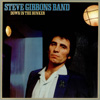STEVE GIBBONS BAND : DOWN IN THE BUNKER
- No Spitting On The Bus
- Any Road Up
- Down In The Bunker
- Big J.C.
- Mary Ain't Goin' Home
- Down In The City
- Let's Do It Again
- Eddy Vortex
- Chelita
- When You Get Outside
- Grace
Label : Polydor Records
Released : 1978
Length : 38:59
Review (AllMusic) : Sometimes referred to as Birmingham, England's answer to Bob Seger, with his working-class rock & roll and tough, British wit, Steve Gibbons' first two releases for MCA were hit-and-miss affairs which garnered him a U.K. hit with Chuck Berry's "Tulane," as well as a fan base that included members of the Who. This would have undoubtedly been enough on which to build a journeyman career, but with his fourth record, Down in the Bunker, there seems to be a shift in attitude - from the choice to use David Bowie and T. Rex producer Tony Visconti on down to Gibbons' new appearance (from bearded, long-haired, leather-clad rocker to clean-shaven, nattily attired bandleader) - that takes things to a new level. And while there's still a bit of Gibbons and company's former rock & roll swagger, there's also an understated intelligence that had been suggested in the past, but is truly evident here. Musically and vocally, Down in the Bunker shows obvious American influences, but lyrically Gibbons' songs touch on questions of class, race, sexual orientation, and trends, with a decidedly British bent. Tracks like "No Spitting on the Bus" and "Down in the City" paint a picture of urban life in England, ranging from its most mundane to its very edge, while "Mary Ain't Goin' Home" is a thoughtful yet never heavy-handed look at race and love. Elsewhere, two of the record's best tracks, the mythical "Big J.C." and the strange postwar golf amalgam of the title cut, suggest certain periods but also seem to defy a definite stamp of time, much like the record's post-pub rock rock & roll. "Big J.C." hints at the Old West without necessarily committing, while "Down in the Bunker" has a more ominous, futuristic, and militaristic feel that seems almost Orwellian at times. Compared with Down in the Bunker, Gibbons' first two major-label studio efforts seem like merely promising indicators of a career that don't really prepare you for what's to come. Reissued on CD in 2000 by Road Goes on Forever, this is the best, most consistently satisfying album of Steve Gibbons' career, as well as one of the highlights of British rock & roll in the late '70s.
